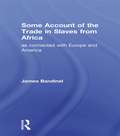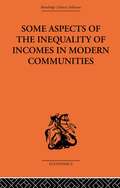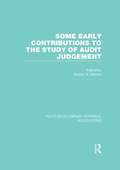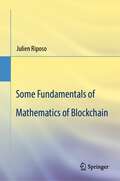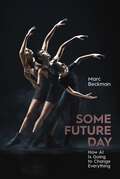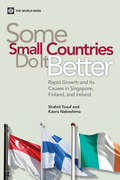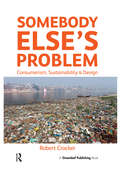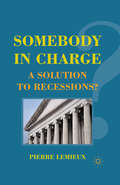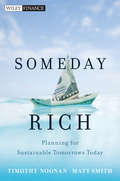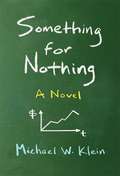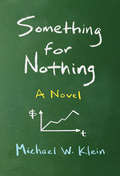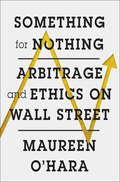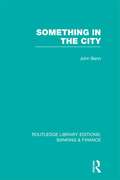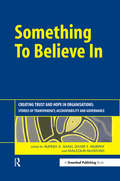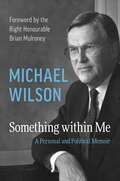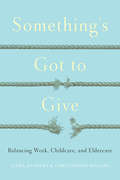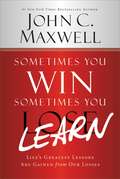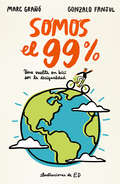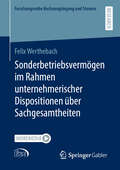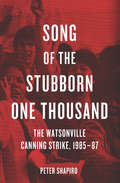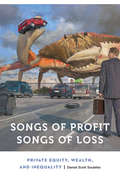- Table View
- List View
Somatus: Value-Based Kidney Care (B)
by Robert S. Huckman Ariel D. Stern Sarah MehtaSet in early 2020, this (B) case provides an update to the (A) case (no. 622-009) and provides additional context regarding the challenges facing Somatus.
Some Account of the Trade in Slaves from Africa as Connected with Europe: On Connected With Europe And America
by James BandinelFirst published in 1842, this account has particular reference to the actions of the British Government.
Some Aspects of the Inequality of Incomes in Modern Communities
by Hugh DaltonDivided into four parts, the book is structured as follows:Part 1: Examines the extent to which the inequality of incomes is guided by ethical principles.Part 2: Illustrates the growth of the theory of distribution in the hands of successive generations of economists.Part 3: Develops the theory on the subject of the division of income between categories.Part 4: Looks at the division of income between people and the causes of that inequality, paying particular attention to the factor of inherited wealth.
Some Early Contributions to the Study of Audit Judgment (Routledge Library Editions: Accounting)
by Robert H. AshtonAlthough there has been increased emphasis on research that attempts to understand, evaluate and improve audit decision making in recent years it is less well-known that some noteworthy contributions to the study of audit judgment were made in the 1950s and 1960s. This anthology contains five such contributions which in the mid 1980s were previously unpublished, out of print or not widely appreciated. The volume discusses: the importance of studying audit judgment actual studies of audit judgment techniques for quantifying the evaluation of internal controls.
Some Fundamentals of Mathematics of Blockchain
by Julien RiposoThis book provides a foundation for the mathematics of blockchain. It is inspired by a general analysis and synthesis of the current knowledge of blockchain technology and starts by laying a foundation for the mathematics of blockchain. The aim is for research in the area of blockchain to lead their study from the construction highlighted in this book.First, the basis of a blockchain is set: block, transaction contents, block header, Merkle tree, nonce, Proof-of-Work. Connections with elliptic curves and cryptographic signatures are made.Second, the book ties this with a Graph and Matrix Theories approach and models the peer-to-peer relationship through the Bitcoin Network.Third, it is proposed further modelling, notably around halving, optimal storing, or diffusion of information, which are consequences of the mathematical foundation. The notion of Entropy of Privacy and the Particles model are introduced.Finally, the mathematical statements therein are proven and essential reminders can be found before each section, so the content can be accessible from a graduate level.
Some Future Day: How AI Is Going to Change Everything
by Marc BeckmanThis cutting-edge guide not only shows how AI is transforming our careers, lives, businesses, and more, but also provides easy, actionable steps to make AI work for us. In this groundbreaking book, celebrated professor, entrepreneur, author, and podcaster Marc Beckman explores the transformative power of artificial intelligence (AI) and how it&’s poised to enhance and transform all aspects of society—revolutionizing our careers, enriching our family lives, and bringing our communities closer together. From business and advertising, to medicine, to warfare, to politics—Beckman meticulously explores the different areas where we&’ll soon feel AI&’s transformative impact. But that&’s only half of it. Throughout this book, he also provides the specific steps readers can take now to make sure these coming changes work for them. From the workplace to the home, AI is poised to reshape the way we approach our professional and personal lives. Beckman uses this book to make the case that AI will free up valuable time and energy, allowing individuals to focus on more creative and meaningful work, but also that AI will create possibilities for engagement that were unthinkable just a generation ago. He shows that with AI as our co-pilot, we&’ll unlock new opportunities for growth, innovation, and collaboration—all of which will lead to more fulfilling and rewarding careers. Beckman illustrates how AI will strengthen family bonds and improve the quality of our home lives too, changing everything from how we educate our kids to how we stay connected on social media. And as AI becomes more integrated into our cities and towns, it will play a crucial role in fostering a sense of community and belonging; through AI-powered platforms, Beckman shows how we will collaborate on projects, share resources, and support one another in times of need. This thought-provoking and essential book is a definitive guide to the many ways in which AI will transform our lives for the better . . . but also surprise us, delight us, force us to (re)consider how we interact with one another, and make us question what exactly counts as &“human.&” Join Marc Beckman on this exciting journey as he explores the near-endless possibilities of a world powered and transformed by artificial intelligence. It&’s an Age of Imagination . . . where the only limit is your own mind.
Some Small Countries Do It Better
by Shahid Yusuf Kaoru NabeshimaCountries worldwide are struggling to imitate the industrial prowess of the East Asian pacesetters, but growth accelerations have proven remarkably transient. Building a portfolio of tradable goods and services and steadily raising the level of investment in these activities, has generally defied the best policy efforts – in particular, bringing investment ratios on par with East Asian averages has presented the greatest challenge. Hence the search is on for growth recipes not so tightly bound to investment, to manufacturing activities, and to the export of manufactured products. In casting around for such recipes validated by demonstrated results, the experience of economies which have relied more on other drivers of growth – human capital and knowledge – is highly attractive. Finland and Ireland are among the tiny band of small nations that grew rapidly for well over a decade by achieving the maximum mileage from an adequate investment in physical assets and by harnessing the potential of human capital and technologies. Singapore combined high investment with a comprehensive and complementary strategy of building high quality human and knowledge assets. This approach enabled the three countries to diversify much faster into higher tech manufactures and tradable services and profit from globalization. The approach adopted by these three countries may be of greater relevance in the highly competitive global environment of the early 21st century because it does not necessarily assume heroic levels of investment. Moreover, it may be better tailored to the opportunities for middle and lower middle income economies threatened by the middle income trap and seeking growth rates in the 6 percent range, and for the smaller, late starting, low income countries with youthful, rapidly increasing populations that need to grow at high single digit rates in order to create enough jobs and to double per capita incomes in 10 years.
Some Thoughts on Business Plans
by William A. SahlmanA framework for assessing new business opportunities and the business plans used to describe them is developed. Useful for aspiring entrepreneurs in MBA programs.
Some Uncomfortable Arithmetic Regarding Europe's Public Finances
by Delia VelculescuA report from the International Monetary Fund.
Somebody Else’s Problem: Consumerism, Sustainability and Design
by Robert CrockerGold winner of the AXIOM Business Book Award in the category of Philanthropy, Non-Profit, Sustainability. Please see: http://www.axiomawards.com/77/award-winners/2017-winners Consumerism promises a shortcut to a 'better' life through the accumulation of certain fashionable goods and experiences. Over recent decades, this has resulted in a rising tide of cheap, short-lived goods produced, used and discarded in increasingly rapid cycles, along the way depleting resources and degrading environmental systems.Somebody Else’s Problem calls for a radical change in how we think about our material world, and how we design, make and use the products and services we need. Rejecting the idea that individuals alone are responsible for the environmental problems we face, it challenges us to look again at the systems, norms and values we take for granted in daily life, and their cumulative role in our environmental crisis.Robert Crocker presents an overview of the main forces giving rise to modern consumerism, looks closely at today’s accelerating consumption patterns and asks why older, more ‘custodial’ patterns of consumption are in decline. Avoiding simplistic quick-fix formulas, the book explores recommendations for new ways of designing, making and using goods and services that can reduce our excess consumption, but still contribute to a good and meaningful life.
Somebody in Charge: A Solution to Recessions?
by Pierre LemieuxCould the financial crisis have been prevented with better leadership? This book explores answers to this question from a scholarly and academic economic viewpoint.
Someday Rich
by Matt Smith Timothy NoonanTo truly be successful, today's financial advisor must strike the right balance between effectively engaging with his or her clients and finding meaningful ways to maintain their financial security. By framing your mission in this way, you can help your clients clarify their vision, build a plan to achieve it, and manage that plan so they stay on track.Nobody understands this better than authors Timothy Noonan and Matt Smith--two seasoned financial professionals with over five decades of combined experience working in the asset management business. And now, in Someday Rich, they show financial advisors with clients who are rich, or have the opportunity to become rich, how to sustain a client's desired lifestyle to, and through, retirement.Engaging and informative, Someday Rich provides the context, description, and implementation suggestions for the Personal Asset Liability Model--a process that will allow you to determine a client's funded status relative to their future spending needs as well as develop and monitor their investment plan accordingly. While the methods in the Personal Asset Liability Model may not have been practically accessible to past advisors with a large number of clients, this model now brings together the technical methods to answer important client questions in a way that is feasible and includes the communication strategies that can make the delivery of the advice model more effective.Along the way, this reliable resource discusses the business of giving good advice and addresses how to incorporate these steps into a client engagement road map. Insights on various other issues associated with this discipline are also included, such as how to develop client trust and deliver personalized service when you have so many clients, and contingency risks--life, health, disability, and long-term care--that need to be considered in the financial planning process. And in later chapters, single-topic essays, contributed by experts in the financial planning field, cover issues ranging from target date funds and the investment aspects of longevity risk to modern portfolio decumulation.Building more valuable relationships with your clients is a difficult endeavor. But with Someday Rich, you'll discover what it takes to achieve this goal as you put them on a path to a sustainable financial future.
Something for Nothing
by Michael W. KleinDavid Fox (Ph. D. Economics, Columbia, Visiting Assistant Professor at Kester College, Knittersville, New York) is having a stressful year. He has a temporary position at a small college in a small town miles from everything except Albany. His students have never read Freakonomics. He thinks he is getting the hang of teaching, but a smart and beautiful young woman in his Economics of Social Issues class is distractingly flirtatious. His research is stagnant, to put it kindly. His search for a tenure-track job looms dauntingly. (The previous visiting assistant professor of economics is now working in a bookstore. ) So when a right-wing think tank called the Center to Research Opportunities for a Spiritual Society (CROSS)--affiliated with the Salvation Academy for Value Economics (SAVE)--wants to publish (and publicize) a paper he wrote as a graduate student showing the benefits of high school abstinence programs, fetchingly retitled "Something for Nothing," he ignores his misgivings and accepts happily. After all, publication is "the coin of the realm," as a senior colleague puts it. But David faces a professional and moral dilemma when he finds that his prized results may just be the consequence of a programming error. The school year is filled with other challenges as well, including faculty politics, a romance with a Knittersville native, running the annual interview gauntlet, and delivering the culminating "job talk" lecture under trying circumstances. David's adventures offer an instructive fictional guide for the young economist and an entertaining and comic tale for everyone interested in questions of balancing career and life, success and integrity, and loyalty and desire.
Something for Nothing: A Novel
by Michael W. KleinA young economic professor's adventures in his quest for a tenure-track position and a well-balanced life. David Fox (Ph.D. Economics, Columbia, Visiting Assistant Professor at Kester College, Knittersville, New York) is having a stressful year. He has a temporary position at a small college in a small town miles from everything except Albany. His students have never read Freakonomics. He thinks he is getting the hang of teaching, but a smart and beautiful young woman in his Economics of Social Issues class is distractingly flirtatious. His research is stagnant, to put it kindly. His search for a tenure-track job looms dauntingly. (The previous visiting assistant professor of economics is now working in a bookstore.) So when a right-wing think tank called the Center to Research Opportunities for a Spiritual Society (CROSS)—affiliated with the Salvation Academy for Value Economics (SAVE)—wants to publish (and publicize) a paper he wrote as a graduate student showing the benefits of high school abstinence programs, fetchingly retitled “Something for Nothing,” he ignores his misgivings and accepts happily. After all, publication is “the coin of the realm,” as a senior colleague puts it. But David faces a personal dilemma when his prized results are cast into doubt. The school year is filled with other challenges as well, including faculty politics, a romance with a Knittersville native, running the annual interview gauntlet, and delivering the culminating “job talk” lecture under trying circumstances. David's adventures offer an instructive fictional guide for the young economist and an entertaining and comic tale for everyone interested in questions of balancing career and life, success and integrity, and loyalty and desire.
Something for Nothing: Arbitrage and Ethics on Wall Street
by Maureen O'HaraFrom a leading financial economist, a searching examination of the ethics of modern finance. In 2001, Goldman Sachs structured a complex financial contract so that its client, the government of Greece, would appear to have far less debt than it actually did. When news of this transaction came out years later, the inevitable question arose: Even though Goldman's actions were legal, were they ethically wrong? Is modern finance itself inherently unethical? In Something for Nothing, financial economist Maureen O'Hara explains that one of the key innovations of modern finance is its reliance on arbitrage, the practice of taking advantage of a price difference between two or more markets to generate profits and remove inefficiencies. When done correctly, arbitrage can create value at little or no cost (in effect, getting "something for nothing"); but it can also be an exploitative tool. In a lucid, insightful discussion of the ethics of arbitrage in modern finance, O'Hara reveals how the rules can often be stretched into still-legal yet highly unethical business practices. Examining key cases in clear and persuasive prose, O'Hara illuminates various aspects of financial ethics, from the Goldman Greek transaction to Lehman Brothers' attempt to cover up its debt, JPMorgan Chase's maneuvers in California's energy markets, Bernie Madoff's trading strategies in the 1980s, high-frequency trading practices, and toxic loans in France. Ultimately, O'Hara turns to philosophy and religion to argue for a new, humanistic approach to ethics in the financial industry. She makes a strong case for a way forward: fewer rules and more standards to foster a morally responsible outlook. Fearlessly raising the questions at the moral heart of our financial system, Something for Nothing is a masterful treatise on the ethics of modern finance.
Something in the City (Routledge Library Editions: Banking & Finance)
by John BennPrompted by the widespread curiosity aroused by the proceedings of the Parker Bank Rate Tribunal, the author has written a non-technical account of daily life in a City office and Boardroom. The author describes the ways in which money is put to work, and explains why the Sterling Area is so important to Britain’s prosperity. He also discusses political developments affecting the City and its future. The book includes references to America and Wall Street.
Something to Believe In: Creating Trust and Hope in Organisations: Stories of Transparency, Accountability and Governance
by Malcolm McIntosh Rupesh A. Shah David F. MurphyIn a world where trust in politicians, corporations and the processes that determine our lives continues to dwindle, this innovative book brings together research, case studies and stories that begin to answer a central question for society: How we can create organisations, institutions, groups and societies that can nurture trusting relationships with one another and among individuals?Something to Believe In provides a fresh take on the corporate responsibility debate, based as it is on the work of key global thinkers on corporate social responsibility, along with a raft of work developed from collaborations between the New Academy of Business and the United Nations Volunteers, UK Department for International Development and TERI-Europe in countries such as Brazil, Nicaragua, Ghana, India, Sri Lanka, Bangladesh, Lebanon, Nigeria, the Philippines and South Africa. The focus is on business, and particularly how deeper, more systemic changes to current ways of understanding and undertaking business can and have been enacted in both developed countries and in nations where the Western concept of CSR means nothing. The market-based model of economic thinking-the increasingly distrusted globalisation project-which threatens to sweep all before it is challenged by many of the contributions to this book.The book tells stories such as the mobilization of civil society in Ghana to bring business to account; the reorientation of a business school to focus on values; the life-cycle of ethical chocolate; the accountability of the diamond business in a war zone; the need to reinvent codes of conduct for women workers in the plantations and factories of Nicaragua; a Philippine initiative to economically empower former Moslem liberation fighters; and the development of local governance practices in a South African eco-village.The book is split into four sections. "Through Some Looking Glasses" contains short, thought-provoking pieces about the issues of trust, belief and change from writers including Thabo Mbeki, Malcolm McIntosh and a reprinted piece from E.M. Forster. Section Two asks how it will be possible to believe in our corporations and provides new approaches from around the world on how space is being opened up to found businesses that are able to create trust. Section Three examines the role of auditing in fostering trust. Corporations continue to attempt to engender trust through their activities in philanthropy, reporting and voluntary programmes. But, post-Enron et al., even the most highly praised corporate mission statements are tarnished. Can social and environmental audits of corporate reports, codes and practices assuage our doubts about boardroom democracy? Section Four examines alternative forms of accountability, transparency and governance from around the world and offers some different ways of thinking about the practice of creating trust in society.Something to Believe In provides a host of fascinating suggestions about redefining and renewing the underlying deal between society and its organizations. It will become a key text for students, thinkers and practitioners in the field of corporate responsibility.
Something within Me: A Personal and Political Memoir
by Michael WilsonThe late Honourable Michael Wilson was a Canadian politician and business professional. As Minister of Finance under Brian Mulroney, Wilson was one of the key negotiators of the Canada-United States Free Trade Agreement – one of Canada’s most important economic agreements in the last 50 years, later superseded by NAFTA. In addition, Wilson was responsible for implementing the controversial Goods and Services Tax (GST), which remains key to the federal government today. After his life in Parliament, Wilson served as Ambassador to the United States and Chancellor of the University of Toronto. Outside of politics, Wilson was active in raising awareness of mental health issues following the traumatic loss of his son, Cameron, to suicide. Devoting considerable time to advocacy, he established the Cameron Parker Holcombe Wilson Chair in Depression Studies at the University of Toronto and served as Board Chair for the Mental Health Commission of Canada. Something within Me highlights how Wilson’s personal life blended with his political life and accomplishments, detailing his advocacy for mental health awareness as well his involvement in important pieces of legislation that made significant impacts in Canadian political and economic history. These deeply personal stories, particularly those of a father grappling with his son’s illness and death, remind us of the lives behind the political personas that shape our world.
Something's Got to Give: Balancing Work, Childcare and Eldercare
by Chris Higgins Linda DuxburyA perfect storm of factors are brewing that will redefine dependent care in the coming decades. Delayed marriage and parenthood, longer life-spans, lower birthrates, and the health policy shift to informal caregiving have drastically increased the number of employees whose mental and physical health suffers due to an inability to balance work, childcare, and eldercare. Employers also feel the pinch as this inability to balance a myriad of demands is negatively impacting their bottom line. Something’s Got to Give is a comprehensive overview of the challenges faced by employees and employers as they try to respond to this dramatic demographic change. Linda Duxbury and Christopher Higgins utilize an original and rich data set–gathered from 25,000 Canadians who are employed full time in public, private, and not-for-profit organizations--to demonstrate the urgent need for workplace and policy reforms and support for employed caregivers. The authors’ timely work provides practical advice to managers and policy-makers about how to mitigate the effects of employee work-life conflict, retain talent, and improve employee engagement and productivity. Business and labour leaders as well as employees who truly care about their careers and industries can’t afford to ignore the solutions that Something’s Got to Give thoughtfully provides.
Sometimes You Win--Sometimes You Learn: Life's Greatest Lessons Are Gained from Our Losses
by John C. Maxwell John Wooden#1 New York Times bestselling author John C. Maxwell believes that any setback, whether professional or personal, can be turned into a step forward when you possess the right tools to turn a loss into a gain. Drawing on nearly fifty years of leadership experience, Dr. Maxwell provides a roadmap for winning by examining the eleven elements that constitute the DNA of learners who succeed in the face of problems, failure, and losses.1. Humility - The Spirit of Learning2. Reality - The Foundation of Learning3. Responsibility - The First Step of Learning4. Improvement - The Focus of Learning5. Hope - The Motivation of Learning6. Teachability - The Pathway of Learning7. Adversity - The Catalyst of Learning8. Problems - The Opportunities of Learning9. Bad Experiences - The Perspective for Learning10. Change - The Price of Learning11. Maturity - The Value of Learning Learning is not easy during down times, it takes discipline to do the right thing when something goes wrong. As John Maxwell often points out--experience isn't the best teacher; evaluated experience is.
Somos el 99%: Una vuelta en bici por la desigualdad
by Gonzalo Fanjul Suarez Marc Graño PlazaSomos en 99% es un libro para abrir los ojos, informarte y descubrir qué medidas puedes tomar para cambiar una realidad que te afecta tanto o más que a nadie. #Somosel99 Vivimos en un mundo en el que: - el 1% de la población toma decisiones contrarias al interés del 99% restante. - uno de cada cinco jóvenes no puede terminar la educación primaria. - con solo una cuarta parte de la comida de se desperdicia al año, podríamos alimentar a los 800 millones de personas que pasan hambre. Escrito con un lenguaje ameno y cercano y con ilustraciones y gráficos, Somos el 99% recoge la historia de cinco personajes (yde sus bicicletas), para informarnos, ponernos en la piel de personas afectadas de distinta manera por la discriminación y proponer medidas sencillas que todos podemos aportar para que la distribución de la riqueza y de las oportunidades sea más igualitaria.
Sonder Holdings Inc: Using Technology to Solve Hospitality's Frictions
by John Deighton Leora KornfeldCase
Sonderbetriebsvermögen im Rahmen unternehmerischer Dispositionen über Sachgesamtheiten (Forschungsreihe Rechnungslegung und Steuern)
by Felix WerthebachAusgangspunkt der vorliegenden Untersuchung ist das Entscheidungsproblem des Mitunternehmers, wie mit diesem SBV, das zwar steuerliches Betriebsvermögen der Personengesellschaft darstellt, eigentumsmäßig gleichwohl nur dem Gesellschafter zuzuordnen ist, im Rahmen von betriebswirtschaftlichen Umstrukturierungs- und Übergabevorgängen (Dispositionen über Sachgesamtheiten) zu verfahren ist. Hierzu werden zunächst die Bausteine der Identifizierung von Sonderbetriebsvermögen herausgearbeitet und die steuerlichen Konsequenzen der Bewegung von SBV innerhalb der einzelnen Dispositionsvorgänge (unentgeltlich - entgeltlich – gegen Gewährung oder Minderung von Gesellschaftsrechten) gezogen. Sodann erfolgt die Optimierung jeder einzelnen Fallgruppe anhand eines entwickelten steuerlichen Zielsystems, verbunden mit hieraus abgeleiteten Handlungsempfehlungen für den betrieblichen Entscheider.
Song of the Stubborn One Thousand: The Watsonville Canning Strike, 1985-87
by Peter ShapiroOn September 9, 1985, one thousand mainly Mexican women workers in Watsonville, California, the "frozen food capital of the world," were forced out on strike in response to an attempt by Watsonville Canning owner, Mort Console, to break their union. They returned to work eighteen months later. Not one had crossed the picket line. A moribund union has been revitalized, and Watsonville's Latino majority emerged as a major force in local politics.At a time when organized labor was in headlong retreat, the Watsonville Canning strike was a dramatic show of the power of women workers, whose struggle became a rallying point for the Chicano movement.Apart from its sheer drama, the strikers' story illuminates the challenges facing a group of ordinary working people who waged a protracted and ultimately successful struggle against seemingly insurmountable odds.
Songs of Profit, Songs of Loss: Private Equity, Wealth, and Inequality (Anthropology of Contemporary North America)
by Daniel Scott SoulelesSince the early 1980s, private equity investors have heralded and shepherded massive changes in American capitalism. From outsourcing to excessive debt taking, private equity investment helped normalize once-taboo business strategies while growing into an over $3 trillion industry in control of thousands of companies and millions of workers. Daniel Scott Souleles opens a window into the rarefied world of private equity investing through ethnographic fieldwork on private equity financiers. Songs of Profit, Songs of Loss documents how and why investors buy, manage, and sell the companies that they do; presents the ins and outs of private equity deals, management, and valuation; and explains the historical context that gave rise to private equity and other forms of investor-led capitalism. In addition to providing invaluable ethnographic insight, Songs of Profit, Songs of Loss is also an anthropological study of inequality as Souleles connects the core components of financial capitalism to economic disparities. Souleles uses local ideas of “value” and “time” to frame the ways private equity investors comprehend their work and to show how they justify the prosperity and poverty they create. Throughout, Souleles argues that understanding private equity investors as contrasted with others in society writ large is essential to fully understanding private equity within the larger context of capitalism in the United States.

